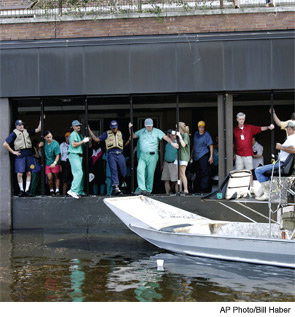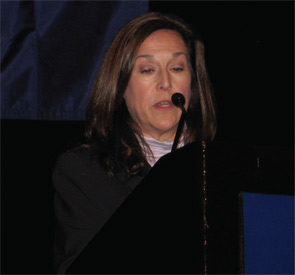
Explore This Issue
February 2012MIAMI BEACH — Anna M. Pou, MD, the Louisiana State University professor of otorhinolaryngology who found herself at the center of the debate over disaster medical care following her work after Hurricane Katrina, told colleagues here on Jan. 28 that disaster could strike anywhere, anytime and that the only way to protect themselves and their patients is to plan now.
Dr. Pou was working at Memorial Medical Center in New Orleans when the levies broke after Katrina, allowing water to engulf the city. There were 2,000 people at the hospital, including patients, hospital staff, their family members, even their pets, when the lights and power went out, sewage overflowed, food and water ran short and temperatures rose to more than 100 degrees.
With rescue efforts scant, hospital staffers were faced with brutal ethical decisions on whom to evacuate, how to treat the rest and how to distribute supplies. Later, the Louisiana Attorney General accused Dr. Pou of injecting patients at Memorial Medical Center with a lethal combination of drugs. In 2007, a grand jury ruled not to indict her.
It’s not a situation she’d want anyone else to suffer through, Dr. Pou said. So she implored the audience at the Triological Society Combined Sections Meeting to think ahead.
“Are you really up to this?” Dr. Pou said. “Planning is imperative. No, it won’t be perfect. Yes, you’ll have to change it. You’ll have to critically think on your feet. But physicians should never be put in a situation of being in a disaster, as we were in New Orleans, with no plan. The better you prepare, the less ethical dilemmas.”
The Federal Emergency Management Agency suggested that the hospitals be self-sufficient for five to 10 days, but the generators were in the basement and they were rendered useless by the flooding.
Since her ordeal, Dr. Pou has spoken out about the need for better disaster planning by the medical community and helped push through legislation in Louisiana giving doctors more protection when they provide care in disaster settings. She said doctors would benefit from military training and suggested that mental health experts should be on hand to help people get through the mental strain of disasters. She also said a legal standard of care and nationwide triage rules are needed.
Tough Decisions
Dr. Pou’s ordeal still seemed fresh as she spoke. On the roof of the hospital, a helicopter dropped down to pick up patients, waiting with family members who wanted to be evacuated with them. Some of them were elderly couples who were separated from each other. Dr. Pou and others feared that they would not survive the ordeal and would never see each other again. Doctors even begged for their patients to be evacuated, saying, “Please let them go first,” Dr. Pou recalled.
The basic ethical tenets often do not hold up in disaster situations because they are at odds with one another, Dr. Pou said. Treatment of patients becomes population based, not individual based—do the greatest good for the greatest number of people.

There may be a “duty to care,” Dr. Poud said, but how long is a physician expected to stay with a dying patient? Physicians were faced with this agonizing question at Lindy Boggs Hospital, where the helicopter evacuation of critical patients was called off due to gunfire.
Also, what about informed consent? “You may say, ‘Why is she talking about that? This is pretty straightforward — you know, it’s a disaster, you do the best you can,’” Dr. Pou said. “And that’s because my colleagues and I were greatly, greatly criticized by ethicists and the media because we did not have a consent form signed by patients that were not ours…. When you’re in this situation, you’re going to take care of whoever’s in front of you.”
Many patients’ doctors had already evacuated and were not there to care for them. “In our case, most of them evacuated to be with their family members,” Dr. Pou said. “They said, ‘We’re not staying. I figured somebody would take care of my patients. I didn’t know who, but I figured somebody would.’”
Dr. Pou said thinking that a disaster will never strike is a dangerous assumption. “Many people felt that what happened in New Orleans was just a fluke, it would never happen to them,” she said. “But as we know, especially over the last year, it’s proven with the tornadoes and the earthquakes that any one of us could be put in this situation.”
The fear of litigation was the reason some nurses working at Louis Armstrong Airport in New Orleans after Katrina declined to give frail patients morphine even when given a doctor’s prescription, Dr. Pou said. They felt they would be held responsible if the patient died, she said.
“You need to make sure that whoever’s in charge of the evacuation at your hospital is competent because your life and the lives of your patients are going to depend on it,” she said. “Healthcare professionals need to be trained in some type of disaster triage and they need to be trained in doing jobs that they don’t normally do. Because you don’t know where you’re going to be when disaster may strike.”
Leave a Reply